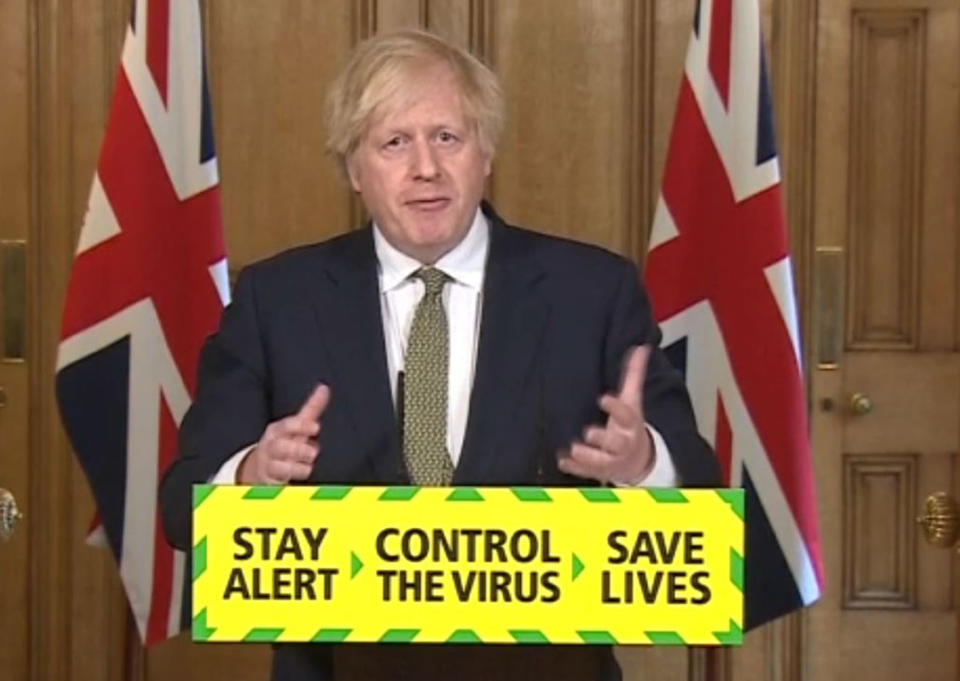Dominic Cummings' 'eyesight affected by coronavirus' - is poor vision a symptom?
Boris Johnson’s chief adviser has defended breaking lockdown, arguing he went on a half-hour car journey to test his eyesight.
Dominic Cummings is facing a backlash after it emerged he drove 260 miles in March from his home in London to his parent’s farm in Durham while his wife was battling suspected coronavirus symptoms.
The adviser and his spouse made the decision to leave the capital out of concern they would both become too ill to look after their four-year-old son and be left without childcare.
During his family’s stay, Cummings was spotted at the beauty spot Barnard Castle in Teesdale, Durham.
Cummings has claimed he was considering returning to London, but his wife suggested they first go on a shorter drive to test his vision, which he says was affected by a suspected coronavirus infection.
Despite calls for Cummings to resign, the prime minister has defended his actions. Johnson claims he too is relying on glasses more after beating the infection, calling his adviser’s defence “very, very plausible”.
With blurred eyesight not a recognised symptom of the coronavirus, it begs the question whether a patient’s vision could theoretically be affected.

Coronavirus: Does it affect eyesight?
The NHS lists the “main symptoms” of the coronavirus as fever, cough and a loss of taste or smell.
Britons who develop any one of these must self-isolate entirely at home for seven days, while other members of their household are required to do the same for two weeks.
The NHS has been criticised, however, for being overly selective in how it defines coronavirus symptoms.
The US Centers for Disease Control and Prevention lists 11 potential signs of infection, ranging from shortness of breath and headaches to nausea and diarrhoea. Poor vision does not make the cut.
According to the World Health Organization (WHO), a fever, dry cough and fatigue are the “most common” symptoms.
“Less common” signs of infection include aches and pains, a sore throat, diarrhoea, headache, muted senses and a rash or discolouration of the fingers or toes.
The only eye-related symptom the WHO lists is conjunctivitis; inflammation or infection of the transparent membrane that lines the eyelid and covers the white part of the eyeball.
Signs of conjunctivitis or “pink eye” include redness, a gritty feeling and tearing.
According to the Mayo Clinic, “though pink eye can be irritating, it rarely affects your vision”.
Nevertheless, eyesight can be impacted if the inflammation spreads to the cornea, it adds.
The NHS recommends seeking medical help if pink eye triggers wavy lines or flashing, but also does not list these as common symptoms.

When asked via email if poor vision is a sign of the coronavirus, Professor Myra McClure from Imperial College London told Yahoo UK she had “never heard that being a symptom”.
A spokesperson for Moorfields Eye Hospital NHS Foundation Trust in London added: “At present, there is very little evidence to suggest that COVID-19 can affect eyesight.”
Early research suggests the coronavirus is mild in four out of five cases, however, it can trigger a respiratory disease called COVID-19.
“Cases where COVID-19 is recorded alongside an impact on eyesight are rare, so we cannot establish a direct causal effect,” added the spokesperson.
“We need more data to be collected on COVID-19 related eye conditions to see if there is an association.”
Professor Robert MacLaren from the University of Oxford argued, however, the coronavirus “can affect the eyes in several ways”.
A study in Wuhan, China – where the infection emerged – suggests a third of its patients’ vision was impacted.
“The ocular manifestations in the Wuhan patients included conjunctivitis, conjunctival hyperemia (red eye), chemosis (eye swelling), epiphora (watery eye) and increased secretions (sticky eye),” said Professor MacLaren.
“Any of the above symptoms may affect vision and affected patients would be advised to drive with caution or not at all if there was significant blurring of vision or double vision.”
A UK study of more than 16,000 patients hospitalised with COVID-19, however, found only around 1% developed conjunctivitis.
“You would probably see this in a normal sample of people without COVID-19,” Professor Paul Hunter from the University of East Anglia told Yahoo UK.
“On balance, I would say ocular symptoms are not a significant feature of COVID-19”.
While it seems somewhat muddled whether Cummings’ defence stands, the coronavirus only emerged at the end of 2019, with there still being relatively little experts understand about the infection.
The NHS only recently added a loss of taste and smell to its list of symptoms, weeks after being flagged by experts.
“There is currently no evidence of sight loss caused directly by the virus, but research is still being carried out into some very rare cases of sight loss that appear to be secondary to other complications such as blood clots caused by the virus,” said a spokesperson for the Royal National Institute of Blind People.
“Any sudden change in vision should be taken seriously and we would recommend seeking immediate medical advice from an optometrist, 111 or NHS Direct.
“If your vision is in any way compromised, we would not advise attempting to drive.”
What is the coronavirus?
The coronavirus is one of seven strains of a virus class that are known to infect humans.
Others cause everything from the common cold to severe acute respiratory syndrome (Sars), which killed 774 people during its 2002/3 outbreak.
Since the coronavirus outbreak was identified, more than 5.5 million cases have been confirmed worldwide, according to Johns Hopkins University.
Of these cases, over 2.2 million are known to have “recovered”.
Globally, the death toll has exceeded 346,600.
The coronavirus mainly spreads face to face via infected droplets expelled in a cough or sneeze.
There is also evidence it is transmitted in faeces and can survive on surfaces.
Symptoms include fever, cough and slight breathlessness.
The coronavirus has no “set” treatment, with most patients naturally fighting off the infection.
Those requiring hospitalisation are given “supportive care”, like ventilation, while their immune system gets to work.
Officials urge people ward off infection by washing their hands regularly and maintaining social distancing.
Coronavirus: what happened today
Click here to sign up to the latest news, advice and information with our daily Catch-up newsletter
Read more about COVID-19
How to get a coronavirus test if you have symptoms
What you can and can’t do under lockdown rules
In pictures: How UK school classrooms could look in new normal
How public transport could look after lockdown
How our public spaces will change in the future
Help and advice
Read the full list of official FAQs here
10 tips from the NHS to help deal with anxiety
What to do if you think you have symptoms
How to get help if you've been furloughed



